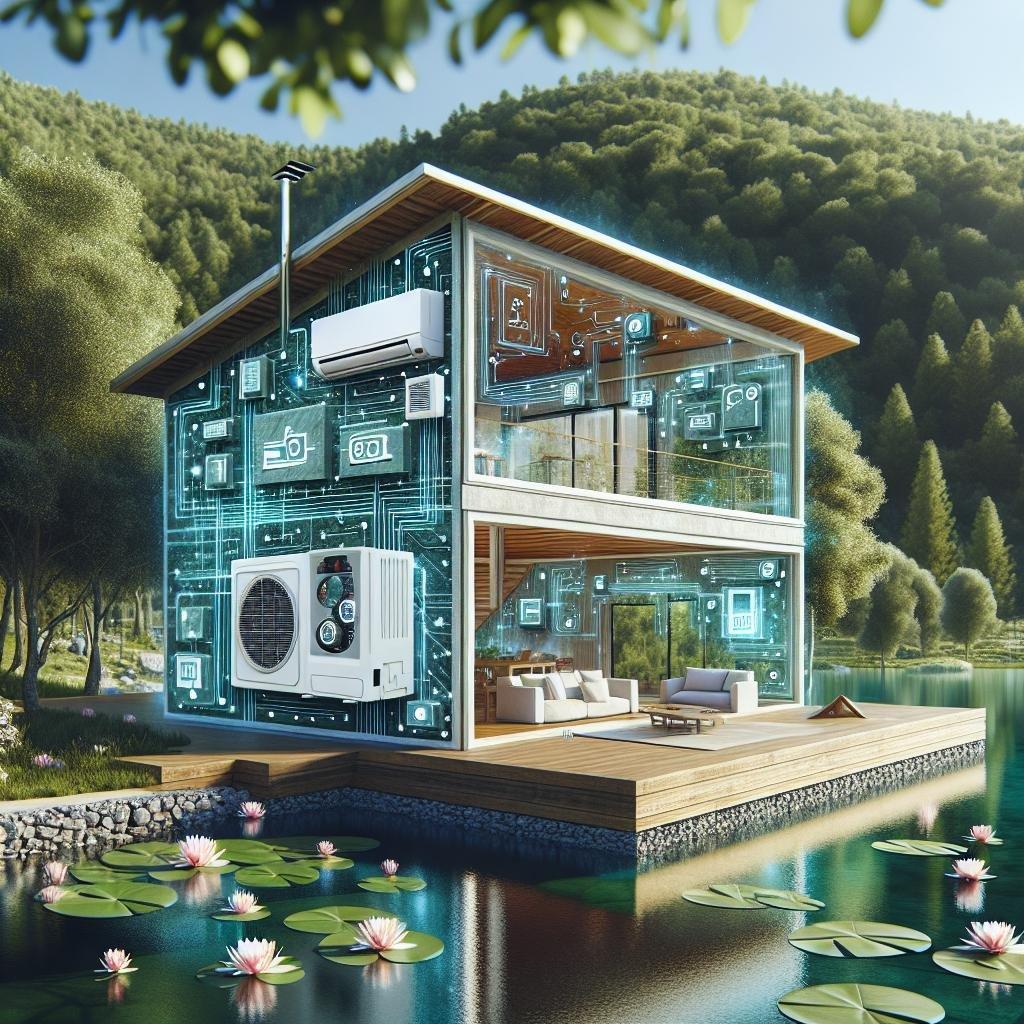As temperatures rise and the demand for comfortable living spaces increases, many homeowners are turning their attention to efficient cooling options—especially when it comes to their cherished vacation homes. A mini split AC system emerges as a compelling choice, offering versatility and energy efficiency perfect for those seasonal retreats. But before diving into installation, it’s essential to understand not only the benefits but also the key considerations that come with fitting this innovative cooling solution into your getaway. In this article, we will explore everything you need to know about installing a mini split AC system in your vacation home, ensuring you can enjoy a refreshing escape whenever the heat beckons. Whether you’re a seasoned DIY enthusiast or navigating the world of HVAC for the first time, we’ll guide you through the process, offering insights that will help you make informed decisions and create a more comfortable haven.
Understanding Mini Split AC Systems for Vacation Homes
Mini split air conditioning systems are an excellent choice for vacation homes, offering an efficient and flexible cooling solution. Unlike traditional central air systems, mini splits consist of an outdoor compressor and one or more indoor units, allowing for personalized climate control in various areas of your home. This is particularly beneficial for seasonal properties where you may not require cooling in every room at all times. Key advantages of these systems include:
- Energy efficiency, often exceeding that of central AC units
- Individual room control, enabling customized comfort for guests
- No ductwork required, simplifying installation and maintenance
When considering a mini split installation in your vacation home, it’s essential to assess both the unit’s capacity and the layout of your property. A professional evaluation can determine the appropriate number of indoor units needed to ensure even cooling throughout your space. Below is a simple comparison table to highlight some essential factors:
| Feature | Mini Split AC | Central AC |
|---|---|---|
| Installation Cost | Moderate | Higher |
| Energy Efficiency | High | Moderate to High |
| Cooling Control | Zone Control | Whole House |
| Space Requirements | Minimal | Significant |
Choosing the Right Size and Capacity for Optimal Comfort
When selecting a mini split AC system for your vacation home, understanding the space’s dimensions is crucial. The right unit size ensures that you achieve optimal cooling without compromising efficiency. Typically, systems are rated in BTUs (British Thermal Units), which indicate the unit’s cooling capacity. To make an informed choice, consider these factors:
- Room Size: Measure the square footage of the area you plan to cool.
- Ceiling Height: High ceilings may require a more powerful system.
- Sun Exposure: Rooms with direct sunlight may need additional cooling capacity.
- Insulation Quality: Well-insulated spaces retain cool air better, potentially reducing capacity needs.
Once you’ve determined the appropriate size, assess the desired capacity. Most places use a general rule of thumb: approximately 20 BTUs per square foot. However, some unique attributes of your vacation home may necessitate adjustments. Below is a simple guide to help you decide on the cooling capacity based on your room size:
| Room Size (sq. ft.) | Recommended BTUs |
|---|---|
| 100 - 300 | 5,000 – 8,000 |
| 300 - 600 | 8,000 – 12,000 |
| 600 - 1,000 | 12,000 – 20,000 |

Installation Considerations for Remote Locations
When installing a mini-split AC system in a vacation home located in a remote area, several factors come into play that can influence both the installation process and the system’s performance. One of the primary considerations is accessibility. If the location is difficult to reach or if it lacks reliable infrastructure, it may complicate the delivery of the unit and the subsequent installation. Additionally, you’ll want to factor in the local climate, as extreme weather conditions can impact both installation logistics and the choice of system sizing to ensure optimal temperature control during your visits.
Another crucial aspect is the availability of skilled labor in your area for the installation and potential maintenance of the system. Not all regions have licensed HVAC professionals, so it’s essential to research and possibly arrange for specialists to travel to your remote location. Also, consider the power supply; determining whether your residence can support a dedicated circuit for the mini-split system is vital, especially in off-grid situations. think about future accessibility for repair or servicing needs, as timely maintenance is essential for ensuring longevity and efficiency.

Maintenance Tips to Ensure Longevity and Efficiency
To extend the lifespan of your mini split AC system and maintain its efficiency, regular upkeep is essential. Begin with monthly filter cleaning to prevent dust buildup, which can hinder airflow and reduce efficiency. Additionally, inspect the outdoor unit for debris such as leaves or dirt that could obstruct airflow. Clearing the area around the unit will ensure optimal performance. You should also schedule annual professional maintenance to check refrigerant levels, inspect electrical components, and verify that all parts are functioning correctly, enabling your system to perform at its peak.
Consider keeping a maintenance log to track all services performed. This not only helps you remember when the last inspection took place but can also be valuable for warranty claims. For your convenience, here’s a quick reference table for essential maintenance tasks:
| Task | Frequency | Description |
|---|---|---|
| Clean Air Filters | Monthly | Remove and wash filters to maintain airflow. |
| Inspect Outdoor Unit | Monthly | Check for debris and ensure proper clearance. |
| Professional Inspection | Annually | Check refrigerant levels and electrical components. |
Q&A
Q&A: What to Know About Installing a Mini Split AC System in a Vacation Home
Q1: What is a mini split AC system, and why is it a good choice for a vacation home?
A: A mini split AC system consists of an outdoor compressor and one or more indoor air-handling units. It offers the flexibility of providing both cooling and heating without extensive ductwork, making it an ideal choice for vacation homes where installation options may be limited. Its efficiency and ability to maintain individual room temperatures allow for customizable comfort during your seasonal retreats.
Q2: Do I need to consider local climate when choosing a mini split system for my vacation home?
A: Absolutely! Understanding your local climate is crucial when selecting a mini split system. Different models are designed to operate efficiently in varying temperature ranges. If your vacation home is in a hot, humid area or places that experience cold winters, consider a unit with a higher cooling and heating capacity to keep you comfortable throughout the year.
Q3: What factors should be assessed before installation?
A: Before installation, evaluate the following:
- Size of the space: Calculate the required BTUs (British Thermal Units) to ensure proper cooling or heating.
- Insulation quality: Better-insulated homes will require less power to maintain temperature.
- Room configuration: Determine how many indoor units you’ll need based on room layout and usage.
- Electrical requirements: Ensure your electrical system can support the new system’s demands to avoid costly upgrades later.
Q4: How complex is the installation process?
A: The installation of a mini split system is generally less invasive than traditional HVAC systems, as it often involves minimal ductwork. However, it does require technical expertise for optimal performance. It’s advisable to hire a professional technician who can assess your home’s specific needs, size the system correctly, and ensure the installation meets local codes and regulations.
Q5: How much can I expect to spend on a mini split AC system?
A: The cost can vary widely based on factors such as the size of the system, number of indoor units, and additional features. On average, you might invest anywhere from $3,000 to $7,000, including installation. Keep in mind that while the upfront costs can be higher than traditional systems, the energy efficiency and potential savings on utility bills often make up for it over time.
Q6: What kind of maintenance is required once the system is installed?
A: Mini splits are relatively low-maintenance but require some routine care:
- Clean the filters: Check and clean the air filters monthly, particularly during peak usage seasons.
- Inspect the outdoor unit: Clear away debris, leaves, and dirt from the outdoor unit to ensure unobstructed airflow.
- Schedule annual maintenance: A yearly professional check-up will help identify potential issues early and maintain the efficiency of the system.
Q7: Can I install a mini split system myself?
A: While DIY installation is possible, it’s not recommended unless you have significant HVAC experience. Incorrect installation can lead to inefficiency, higher bills, and even voided warranties. Hiring a qualified technician ensures the job is done correctly and safely, providing peace of mind while you enjoy your vacation home.
Q8: Are there specific features I should look for in a mini split AC system?
A: Yes! When shopping for a mini split system, consider:
- SEER rating (Seasonal Energy Efficiency Ratio): A higher SEER rating indicates better energy efficiency.
- Noise levels: Some units are designed to operate quietly, which is especially important in a vacation setting.
- Wi-Fi capability: This feature allows you to control the temperature remotely, making it easy to pre-cool your home before your arrival.
- Multi-zone capability: If your vacation home has several rooms, look for a system that can handle multiple zones for personalized comfort.
Q9: Will installing a mini split AC system increase my property value?
A: Yes! An efficient HVAC system, such as a mini split AC, can enhance your vacation home’s desirability and value. Potential buyers often appreciate energy-efficient systems that require less maintenance, making your property a more attractive investment.
Q10: What’s the last thing to remember when installing a mini split AC system in my vacation home?
A: Always prioritize energy efficiency and comfort over initial costs. While it may be tempting to cut corners for a lower initial investment, a well-suited, efficiently installed mini split system will provide benefits for years to come, making your vacation home a tranquil retreat for all seasons.
Insights and Conclusions
installing a mini split AC system in your vacation home can transform those sweltering summer days into comfortable escapes, providing a perfect sanctuary to unwind and relax. By understanding the basics of installation, maintenance, energy efficiency, and cost considerations, you can make a well-informed decision that enhances your home away from home. Whether you’re escaping for the weekend or enjoying an extended stay, investing in a mini split system ensures a refreshing environment tailored to your needs. As you embark on this journey, remember that a little preparation goes a long way. Embrace the comfort, relish the tranquility, and let your vacation home be a true haven no matter the season. Safe travels!

